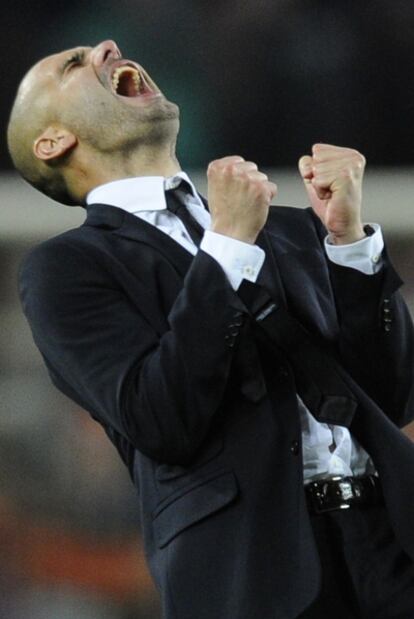Barça circles date with destiny
Champions League final at Wembley marks return to start of triumphant era
A virtuous blaugrana circle has closed. Wembley, where Barcelona first touched heaven under the leadership of Johan Cruyff in 1992 with a young Pep Guardiola in the center of midfield, is now to be the stage of the club's bid to win its fourth Champions League title after Tuesday night's elimination of national rival Real Madrid.
A year ago, as Barcelona fans in the Camp Nou celebrated another Liga championship, Guardiola, since 2008 head coach at the club where he had so much success as a player, made a solemn promise. "I just want to say that we owe you one. There's a place we should be going to next Saturday, but we didn't manage it. We owe you one... And these guys won't fail!"
The Saturday to which Guardiola was referring was the day of last season's Champions League final; the place, the Bernabéu. The two teams facing each other at Real Madrid's stadium were Bayern Munich and Inter Milan, the latter having knocked out Barcelona in the semifinal under the guidance of José Mourinho before going on to beat the German team and take the trophy. That defeat left its scars at the Catalan club, and was probably what sealed the decision to sign Mourinho for Real Madrid, so anxious to topple Barça from its position as the dominant club in Spain and across Europe in recent seasons.
Barcelona did not get to play that match in the Bernabéu but, with the showdown in London it will now be preparing for, the reigning Liga champion has now been in three Champions League finals in the past six years. In 2006 coach Frank Rijkaard's Cruyffian Barça outfit, led from the front by Ronaldinho and Samuel Eto'o, beat Arsenal 2-1. Then in Rome in 2009, Guardiola's first campaign in charge officially became a wonder season with a 2-0 victory over Manchester United to wrap up a league, King's Cup and Champions League treble.
If Manchester United is again Barcelona's opponent, Sir Alex Ferguson's side will this time have home advantage and an improving team built on a blend of established stars such as Wayne Rooney and Ryan Giggs, as well as the fast-emerging Latin American talents of Javier Hernández ("Chicharito") and Antonio Valencia. United and Germany's Schalke 04 were playing at press time last night to decide which will try to stop Barcelona at Wembley on May 28, with the English team defending a 2-0 lead from the first leg in Gelsenkirchen.
On Tuesday night Barcelona was in the same position, having deservedly won the first of the semifinal clásicos in the Bernabéu 2-0, despite the howls of protest at refereeing decisions led by chief polemicist Mourinho. At Camp Nou, Real again felt cheated, having put the ball in the net first for a goal that would have cut Barça's overall lead to just one, only to see the Belgian ref blow up for a debatable foul in the build-up by Cristiano Ronaldo.
To compound Real's misery, the home team went straight up the field and scored, Pedro making no mistake after being picked out by Andrés Iniesta. Marcelo pulled back one of the three that Real now needed but the last in the emotionally exhausting series of matches between the two rivals then fizzled out as a 1-1 tie.
So Barcelona reaches its seventh elite European final with the relief of having put the pain of the 2000 semifinal loss against Real behind it. The 1992 win at Wembley over Sampdoria, in a game decided by a thumping free kick from the boot of the redoubtable Ronald Koeman in extra time, was "the most important day in the history of Barcelona after 90 years of suffering," in the words of Cruyff.
Previously, Barça had been in two finals, losing 3-2 against Benfica in Berne in 1961, and falling in a 1986 penalty shootout against Steaua Bucharest in Seville. But London 1992 changed the destiny of Barcelona, despite the 4-0 thrashing at the hands of the great AC Milan side of 1994. It was the day Barça began to play catch-up with Real Madrid, which still leads the continent with nine titles.

Tu suscripción se está usando en otro dispositivo
¿Quieres añadir otro usuario a tu suscripción?
Si continúas leyendo en este dispositivo, no se podrá leer en el otro.
FlechaTu suscripción se está usando en otro dispositivo y solo puedes acceder a EL PAÍS desde un dispositivo a la vez.
Si quieres compartir tu cuenta, cambia tu suscripción a la modalidad Premium, así podrás añadir otro usuario. Cada uno accederá con su propia cuenta de email, lo que os permitirá personalizar vuestra experiencia en EL PAÍS.
¿Tienes una suscripción de empresa? Accede aquí para contratar más cuentas.
En el caso de no saber quién está usando tu cuenta, te recomendamos cambiar tu contraseña aquí.
Si decides continuar compartiendo tu cuenta, este mensaje se mostrará en tu dispositivo y en el de la otra persona que está usando tu cuenta de forma indefinida, afectando a tu experiencia de lectura. Puedes consultar aquí los términos y condiciones de la suscripción digital.








































